Pro-government political advertisements are in record heights in Hungary, promoting hostile narratives against the West
Political Capital Institute has been doing research on the Hungarian (dis)information landscape and its specificities for years. We have analyzed how the Hungarian state exerts its dominance in the information space in Hungary, how Russian disinformation is spreading in the Hungarian media space, and in the Hungarian electoral campaigns. We also analyzed how the Hungarian state and its proxies are spreading their disinformation narratives abroad, and how the centrally controlled media environment in Hungary is selectively filtering disinformation - giving the green light to pro-Russian disinformation, but a yellow light to Covid-skeptic.
This analysis focuses on how political actors in Hungary use digital advertisements for information manipulation in the social media space. We focus on the most popular platforms: Meta (Facebook and Instagram) and Google (YouTube).
This analysis is also available as a .pdf file here.
Funded by the European Media and Information Fund, the consortium of Political Capital, the Hungarian fact-checking site Lakmusz and the media think tank Mertek Media Monitor is detecting, monitoring, analyzing, and debunking sponsored disinformation during the 2024 election campaign leading up to the European Parliament and local elections in Hungary on 9 June. For the first time in Hungary, we are also monitoring how much money social media platforms are making by promoting false and misleading information.
Political Capital has been monitoring political advertising on Facebook and Google since early 2024, tracking spending on ads, advertisers, and the narratives. We focus on narratives that fit the definition of what is known in the literature as "hostile narratives". This definition is broader than disinformation, but not synonymous with the term propaganda. In our methodology hostile narratives are characterized as 1.) the deliberate distortion of facts via narration and manipulative storytelling; 2.) the exaggeration of existing fears and perceived threats; 3.) the portrayal of socio-political actors and opponents as enemies.
The analysis below covers the results for the first three months of 2024 up to 6 April. The first part focuses on the promotion of political content on social media, showing which actors spent how much and for how long to get their message across. The second and third parts focus on the promotion of 'hostile narratives', showing who is promoting them, which narratives are most widely circulated and which hostile terms are used in these narratives to portray enemies.
Key findings
- As the European Parliament and local elections are approaching in Hungary, online political advertising is on the rise. Between 31 December 2023 and 6 April 2024, pro-government actors in Hungary spent around EUR 1 million on Facebook and Google to promote their messages. This is five times more than the social media spending of all opposition parties combined.
- As the comparative figures from our partner Lakmusz show, Hungary has the third highest political spending on Meta and the second highest on Google among 27 EU Member States. As the asymmetry in the spending figures reveals, this is mainly due to government and pro-government ads – many of which contain disinformation and/or hostile narratives..
- The governing Fidesz party uses proxies such as government-organized NGOs (GONGOs), top-down “influencer” platforms and government-organized media to amplify its messages. In total, four of the 10 most funded Google ads between 1 January and 15 April 2024 were paid for by a pro-government GONGO, which spent EUR 156,000, making it the fourth largest political advertiser in the whole EU.
- Fidesz and its satellite organizations are the main – and almost sole – spreaders of hostile disinformation narratives in Hungary, responsible for 98% of the total amount spent on promoting such narratives. All other opposition parties and their proxies were responsible for only 2%.
- One of the main hostile narratives spread by government-organized actors is that “European leftist pro-war politicians want to start World War III. Ursula von der Leyen, Emmanuel Macron, Donald Tusk, Olaf Scholz, Manfred Weber, and several ministers in the German and Polish governments – the majority of which belong to the center-right - are targeted by these narratives.
- In addition, domestic opponents of Viktor Orbán are accused of being „pro-war, pro-migration, and pro-gender” in the service of the “globalist lobby”. Opposition parties and the independent media are also being labeled as “foreign agents funded by George Soros”. Pro-governmental Facebook pages have spent more than EUR 370,000 only on discrediting the new opposition politician Péter Magyar.
- This level of social media dominance makes the political contest in Hungary truly one-sided and points to the problem of massive state-sponsored information manipulation in the EU and NATO.
1. Social media advertising in the election campaign in Hungary
1.1. Fidesz and its proxies vs. the opposition and its proxies
During the last parliamentary elections in Hungary, astronomical amounts were spent – mostly by pro-governmental actors - on advertised political messages on social media. The current election campaign seems to follow this trend. From the beginning of this year to 6 April, the pro-Fidesz camp spent almost EUR 1 million on Facebook and Google ads, five times as much as the opposition and its proxy platforms altogether (see Figure 1.).
From the beginning of 2024 until the 6 of April Fidesz politicians – without their proxies - had spent EUR 192,000 on Facebook and Google. This amount alone is roughly equal to the total amount spent by 13 opposition parties (EUR 198,000). However, Fidesz hides behind proxies when it comes to flooding the public with pro-governmental and smear messages. Government-organized actors such as Megafon, an organization that trains, coordinates, funds, and promotes pro-government social media ’influencers’, and Civil Union Forum (CÖF), a GONGO to which Fidesz usually outsources its negative campaigning, spent an additional EUR 794,000 on social media ads. As our partner Lakmusz has shown, Megafon alone spent more on political ads on Meta between 15 January and 13 April 2024 than all advertisers combined in Slovakia, which ranks 14th in the list of total political ad spending in EU Member States on Meta in the same period. In comparison, proxies of the opposition parties, especially Nyugati Fény and Ellenszél, both of which spread the messages of the former Prime Minister Ferenc Gyurcsány’s Democratic Coalition (DK) party, spent EUR 14,180 on social media promotion.
Figure 1: Political advertisements on Facebook and Google (in Euros, between 31 December 2023 and 6 April 2024, source: weekly reports from Meta Ad Library and Google Ads Transparency Center)
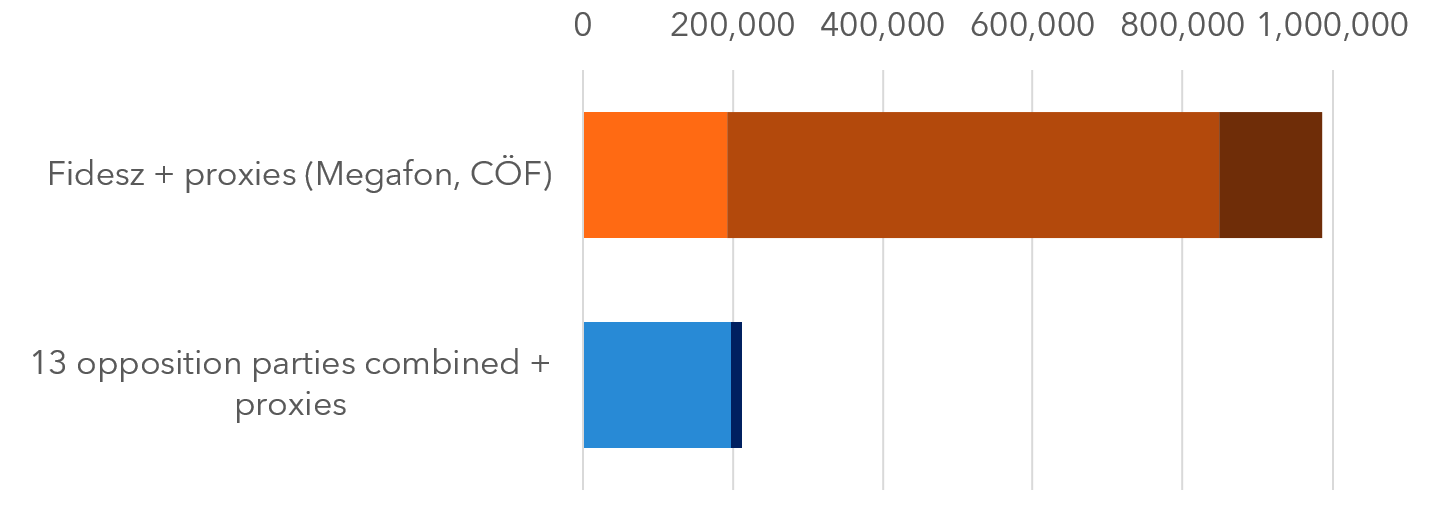
As the campaign progresses, the gap in advertising spending between Fidesz and the opposition parties widens (see Figure 2 below). In other words, even without proxies, the difference in available resources between the governing party and the opposition is spectacular. This gives Fidesz a significant advantage in reaching potential voters – in line with the assessment of the OSCE-ODIHR's election observation mission on the 2022 parliamentary elections in Hungary, which found a huge asymmetry in the access to the public arena between the governmental side and its opponents.
Figure 2: Weekly ad spending by political parties and politicians on Facebook (in Euros, aggregated data based on party affiliation of politicians, candidates, and affiliates running ads, source: weekly reports from Meta Ad Library)
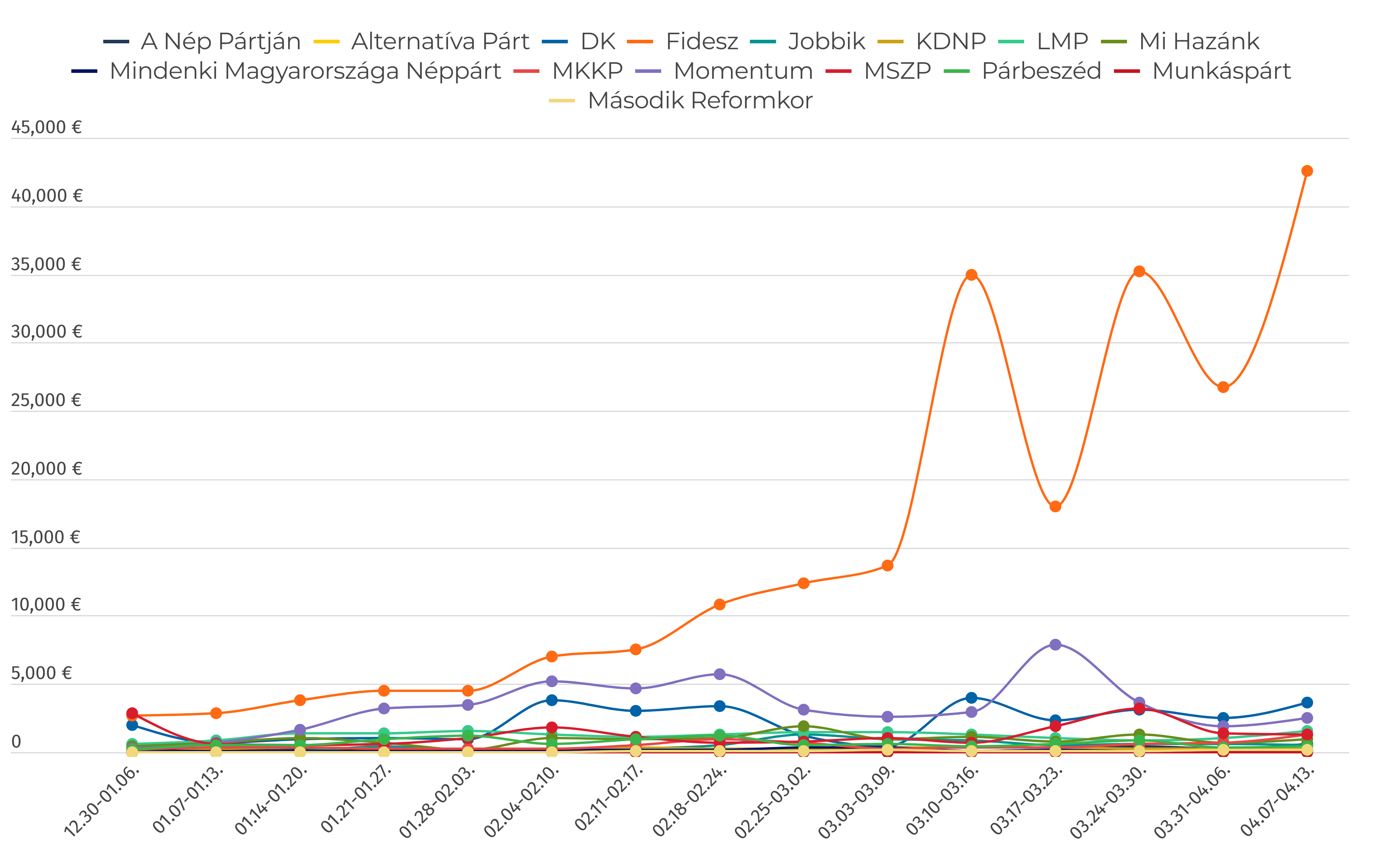
1.2. Pro-government media vs. independent media
The pro-government media empire, which is highly centralized and controlled by the government, spent EUR 439,000 to advertise its content, while media outlets independent from the government spent only one-twentieth of that in the same period (see Figure 3.). Note that not all their advertising is political. However, government-organized media are often involved in the marketing of political issues.
Figure 3: Political campaign spending on Facebook and Google (in Euros, between 31 December 2023 and 6 April 2024, source: weekly reports from Meta Ad Library and Google Ads Transparency Center)
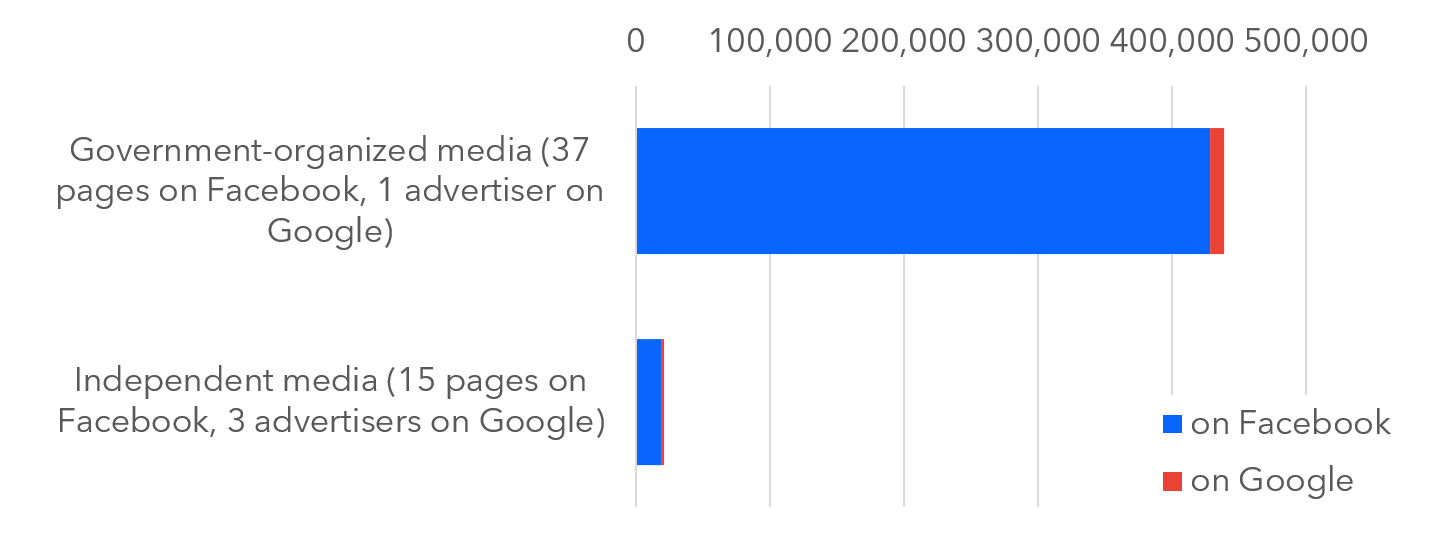
2. The main promoters of hostile narratives
Fidesz and its satellite organizations are the main – and almost sole – spreaders of hostile disinformation narratives in Hungary, responsible for 98% of the total amount spent on promoting such narratives, while all other opposition parties and their partisan media were responsible for only the remaining 2%.
Fidesz uses proxies such as government-organized NGOs (GONGOs) and government-organized media to amplify its messages. Of all the money spent on advertising pro-government hostile narratives, EUR 713,000 was spent by these proxies, while Fidesz spent only EUR 23,000 directly.
Fidesz’s covert communication efforts were led by Megafon’s pro-government ’influencers’, who spent at least EUR 480,219 on videos spreading hostile narratives targeting every real and imagined opponent of the government. This accounts for nearly two-thirds (64%) of all spending.
Government-organized media outlets spent a total of at least EUR 164,286 on hostile narratives.
CÖF is playing an increasingly important role in the campaign, with its short videos targeting opposition politicians being promoted on both Facebook and Google for at least EUR 65,646.
Anti-government hostile narratives are also present but remain almost below the surface. All opposition parties, mainly DK and their proxies, spent a total of EUR 16,535 on advertising content with hostile narratives (see Figure 4.).
Figure 4: Ad spending on hostile narratives on Facebook, by advertiser (in Euros, based on individual ads active between 4 February and 6 April 2024, downloaded via Meta Ad Library API and categorized by Political Capital)
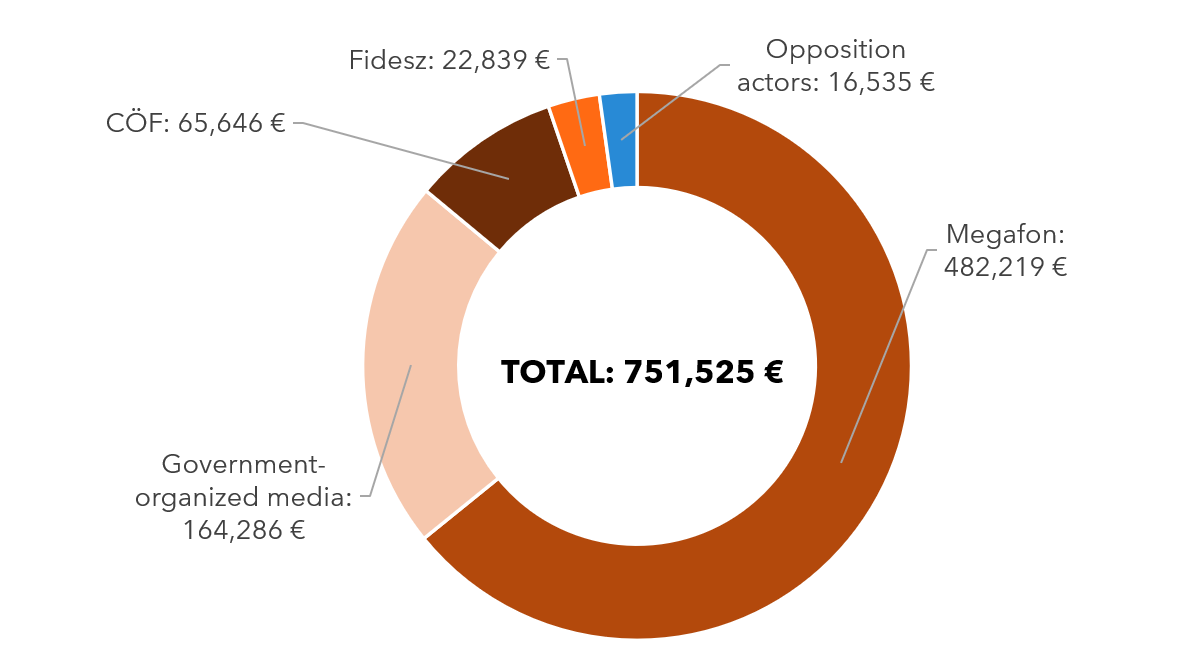
3. The most promoted hostile narratives and terms
Figure 5: Ad spend on hostile narratives on Facebook, by narrative (in Euros, based on individual ads active between 4 February and 6 April 2024, downloaded via Meta Ad Library API and categorized by Political Capital)
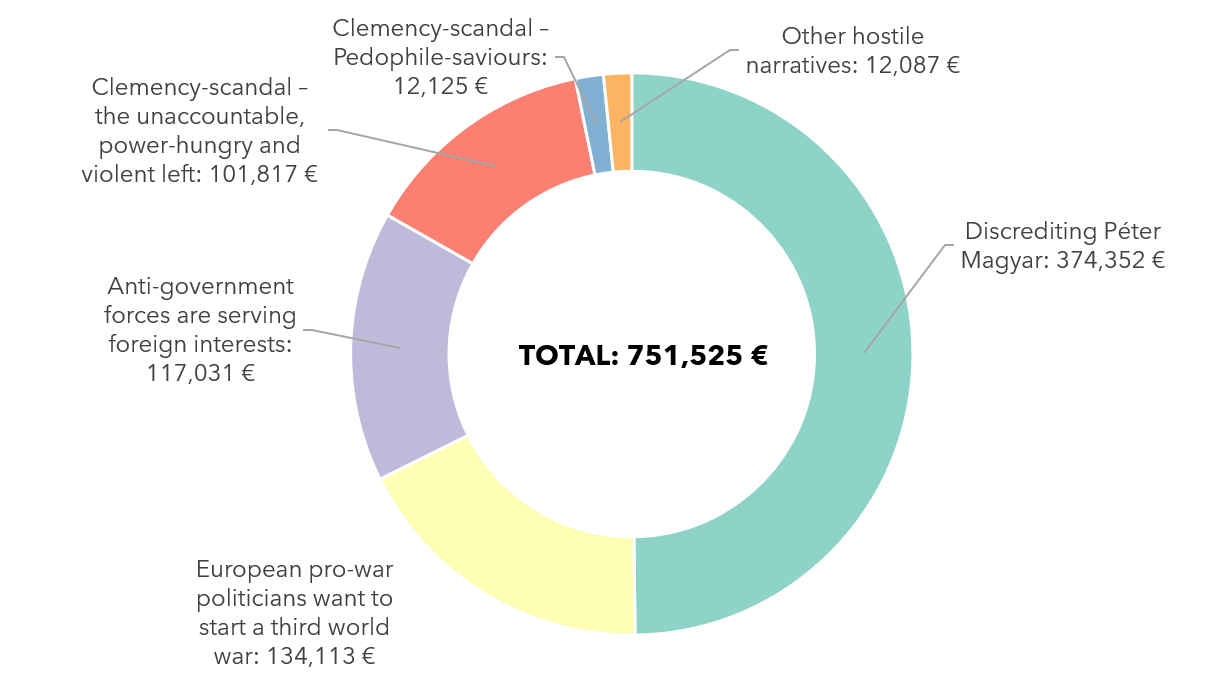
3.1. Discrediting Péter Magyar
The most promoted hostile narrative targeted the newly emerged opposition hopeful Péter Magyar, who entered the political arena after the clemency scandal erupted in early February. Hostile narratives aimed at discrediting him alone were promoted for a total of at least EUR 374,352. While the vast majority of this amount was spent by Fidesz and especially its proxies, a small part was spent by hyperpartisan media outlets close to the opposition party DK.
The discrediting campaign by pro-government actors, particularly the government-organized media and Megafon ‘influencers’, has promoted multiple narratives about Péter Magyar, accusing him of being a “power-hungry” person, who had become the “new leftist messiah”, to serve the interests of the “American left owned by the empire of George Soros”. After his ex-wife revealed details of their failed marriage, claiming that Magyar had abused her, the smear campaign kicked into high gear, and Magyar was regularly branded as a personality-disordered, violent man (see the hostile terms below).
The intense Russian-style smear campaign against Magyar is aimed at protecting Fidesz’s voter base and neutralizing the political risk of Magyar’s rise, by trying to discredit him both personally and politically.
Hostile terms used in the narrative: the left’s new messiah; leftist lie masquerade; left-wing star-makers and messiah-carvers; liberal-commies; life-threatening mental disorder; Iombic messiah; metropolitan liberal messiah; narcissistic footballer’s wife; new globalist investment; petty blackmailer; Psycho Péter; power-hungry abuser; project of the American left; the left’s endless cesspool; the nightmare of psychologists; wife terrorizing, wiretapping, family humiliating, leftist little bully; libtard
Background: Who is Péter Magyar?
After the clemency scandal and the resignation of both President Katalin Novák and former Justice Minister Judit Varga, the ex-husband of the latter, Péter Magyar stepped into the political scene. His accusations against the government, the prime minister, and several ministers are powerful mainly because he was a member of the regime’s inner circle and held senior positions in state-owned companies. As he grabbed the attention of the public, rallying tens of thousands of people on multiple occasions, he decided to start a party challenging both the governing Fidesz and all opposition parties. According to some recent polls, his party has around 14 percent support among active voters with party preferences.
3.2. “European pro-war politicians want to start a third world war”
The second most promoted hostile narrative is that “European pro-war politicians want to start a third world war”. Pro-government actors spent EUR 134,113 or around 18% of the total, on attacking the so-called „European pro-war politicians” who are contrasted with the government’s peace narrative.
Megafon’s pro-government ‘influencers’ have manipulatively edited excerpts of speeches of European politicians, accusing them of being “warmongers”, in the service of the “globalist war lobby”. The World War III narrative reinforces the false message that this year’s election is (also) a choice between war and peace. The argument is that the ‘pro-war left’ and most Western countries want to drag Europe into the Russian-Ukrainian war by sending weapons and troops to help Ukraine. On the other hand, the right, led by Fidesz, is pro-peace, and it alone wants to end the military conflict by advocating for a ceasefire and peace talks. The European politicians targeted by these narratives include Ursula von der Leyen, Emmanuel Macron, Donald Tusk, Olaf Scholz, Manfred Weber, and several ministers of the German and Polish governments. Most of them are simply labeled as “leftist”, even though many of them belong to right-wing parties (see Lakmusz’s fact-checking piece on this topic).
This narrative is built upon years of pro-Kremlin disinformation campaign of Fidesz and the government-organized media in Hungary, spreading conspiracy theories about Ukraine, and the West’s role in the conflict, often directly borrowing from Russian strategic narratives.
Hostile terms used in the narrative: Brussels bullshit train; European politicians drunk on war psychosis; global beepers; globalist left-wing war hawks; Polish leader burning with battle fever; pro-war Brussels leaders; Soros-bitches; Soros-shuffle mix; Sorosist Polish minister; the left has been completely taken over by the psychosis of war; the Polish government that aggressively took power; the war train has no brakes; war profiteers; war-hungry globalists; wartime insanity.
3.3. “Anti-government forces serve foreign interests”
Third on the list of spending on hostile narratives is the narrative that “anti-government forces serve foreign interests”, which was promoted for EUR 117,031, accounting for 16% of the total.
According to this narrative, the opposition parties and independent media are foreign agents funded by George Soros and the so-called “international globalist war, migration, and gender lobby” to serve their interests in Hungary. They are accused of “being in the pockets of the globalists” to “drag Hungary into the Russo-Ukrainian war, allow illegal immigrants into the country, and spread gender propaganda to poison children’s minds”. The labels “dollar left”, “dollar media” and “dollar celebrity”, built up over the last two years, are used by the governing party and its media as synonyms for foreign agents to stigmatize any anti-government or independent organization or individual – following the Russian model.
Hostile terms used in the narrative: betrayed the entire nation; dollar army; dollar celebrities; dollar left; dollar media; dollar pimps; dollar workers; fooling the Hungarians for a few bucks; globalist masters of the left; Hungarian-poisoning Soros-dollars; LGBTQ brainwashing; leftist scheming Brussels; pro-war left-wing politician bought with dollars; sold out the country for dollars; Soros empire; traitors; treasonous politician; violent woke propaganda; war-gender-migration propaganda.
3.4. Clemency scandal: the pro-government narrative about the “unaccountable, power-hungry and violent left”
The pro-government messages to reframe the clemency scandal are the fourth most promoted hostile narrative with spending of EUR 101,817 or 14% of the total. This narrative attacks opposition politicians and the independent media that exposed the scandal as allegedly “irresponsible”, “power-hungry” and “violent”.
The narrative is that Novák and Varga have taken political responsibility by resigning and admitting “failure”, authentically representing the values of the right-wing community, while in contrast, opposition politicians (uniformly labelled as left-wing) never take responsibility for their actions and sins. The government-organized media has also accused opposition politicians of using the issue of child protection for their political gain, and that they are a group of “unaccountable”, “power-hungry” and “violent” individuals, who will use any means to gain power.
Hostile terms used in the narrative: bearded women; crazy woke-people; crimes against the nation; hypocritical and two-faced left; Sorosists comrades; the jackals of our public life; the left’s gender-fever-induced insanity; the left-without-consequences; trans-lobby; violent antifas; violent gender-propaganda
Background: What is the clemency scandal?
The so-called clemency scandal, resulting from a presidential pardon granted to an individual who had been convicted of covering up a child sexual abuse case, and who had close ties to senior figures in the ruling party, has shaken the government in February 2024. Following the subsequent resignation of President Katalin Novák, and former justice minister, Judit Varga, who were directly involved in granting the pardon, the ruling party and its media immediately tried to reframe the issue.
3.5. Clemency scandal: the opposition’s narrative about “pedophile saviours”
Opposition politicians, mainly from the DK party, spent EUR 12,125, two percent of the total, to promote their hostile narratives attacking the Orbán government over the clemency scandal.
The opposition politicians’ narrative has labelled prominent government politicians, including former President Novák, and Prime Minister Viktor Orbán “pedophile saviours” for their role in the decision. In addition, as new evidence emerged of the pardoned person’s links to senior figures in the ruling party, including Viktor Orbán’s family and the now-former leader of the Reformed Church in Hungary, opposition politicians began to talk about the so-called “Orbán pedophile network”.
Hostile terms used in the narrative: Orbán pedophile network; pedophile protector president; pedophile groomers; a vile child protection law; hunting ground for Fidesz paedophiles.
3.6. Other hostile narratives
Other hostile narratives on different topics accounted for EUR 12,087 spent by several different actors.
We identified dozens of other ads that more or less fit the concept of hostile narratives, but reached far fewer people because of the lower spending on them. These included pro-Kremlin and anti-Ukrainian narratives related to the Russo-Ukrainian war and Sweden’s NATO accession, which were spread by government-controlled media outlets, and the far-right Mi Hazánk party. A prominent example was the alleged plan of the Ukrainian government to occupy Hungary if it lost the war against Russia. This story was quickly debunked by our partner Lakumsz. Mi Hazánk has also promoted several conspiracy theories about total digital surveillance by companies and the state, exaggerating the risks of artificial intelligence and online payment solutions.
A consortium led by Political Capital and including Lakmusz and Mérték Médiaelemző Műhely has won a €143,000 grant from the European Media and Information Fund (EMIF) for the implementation of the project on electoral disinformation. Any content supported by the EMIF is the sole responsibility of the author(s) and does not necessarily reflect the views of the EMIF or of the Fund's partners, the Calouste Gulbenkian Foundation and the European University Institute.


